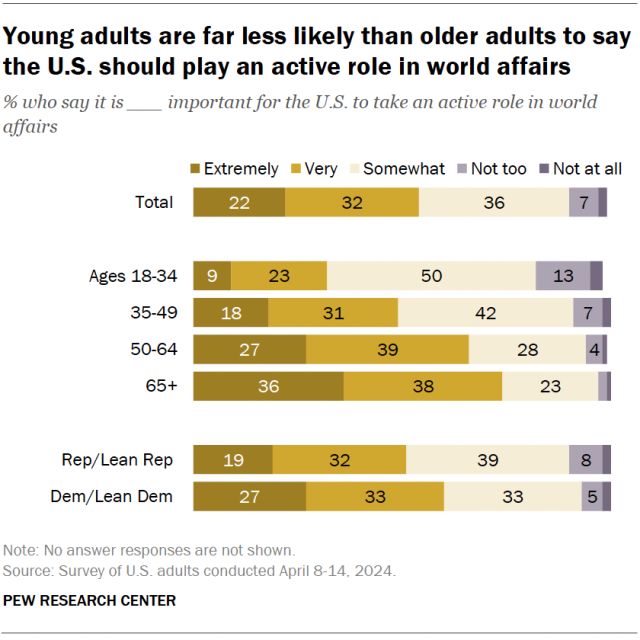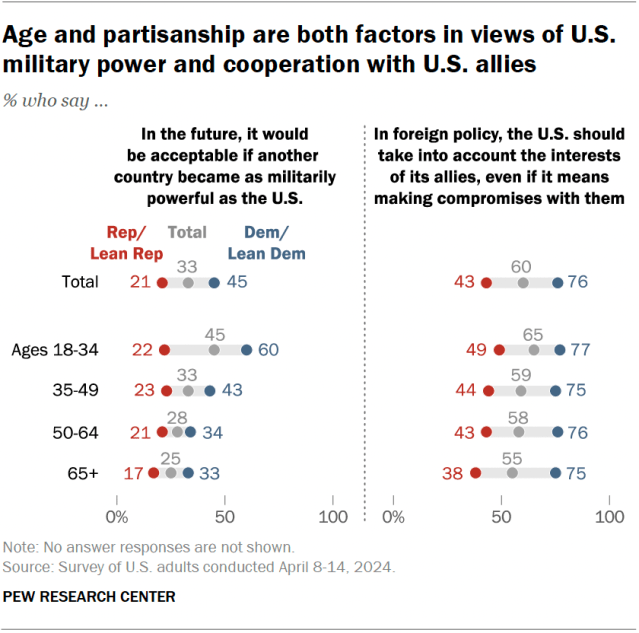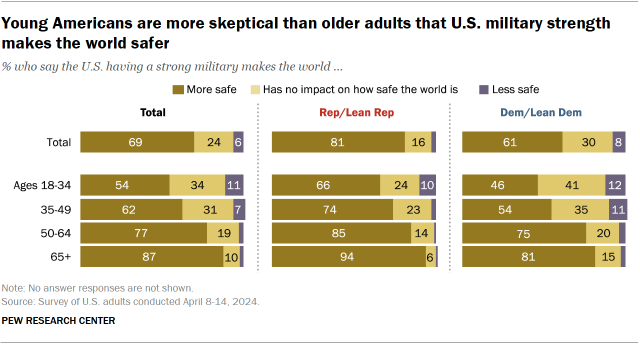As the United States deals with major conflicts around the world, there continue to be wide partisan gaps in views of working with U.S. allies and the importance of American military strength.
Americans’ views on the country’s global role also differ by age, according to a spring Pew Research Center survey.
Older adults are more likely than younger people to value active U.S. engagement in world affairs:

- 33% of adults under age 35 say it is extremely or very important that the U.S. play an active role in world affairs.
- That compares with 49% of those 35 to 49, 66% of those 50 to 64, and 74% of those 65 and older.
The partisan gap on this question is relatively modest: 51% of Republicans and Republican-leaning independents say it is at least very important that the U.S. should play an active role in world affairs, compared with 60% of Democrats and Democratic leaners. No more than one-in-ten in either party say it is not important for the U.S. to be active in international affairs.
Pew Research Center conducted this study to better understand how adults view some U.S. foreign policy values. These questions were part of a larger survey exploring Americans’ social and political attitudes.
We surveyed 8,709 U.S. adults from April 8 to 14, 2024. Everyone who took part in this survey is a member of the Center’s American Trends Panel (ATP), an online survey panel that is recruited through national, random sampling of residential addresses. This way nearly all U.S. adults have a chance of selection. The survey is weighted to be representative of the U.S. adult population by gender, race, ethnicity, partisan affiliation, education and other categories. Read more about the ATP’s methodology.
Here are the questions used for this analysis, along with responses, and its methodology.
Related: U.S. adults under 30 have different foreign policy priorities than older adults
America’s superpower status and relationships with allies
A majority of U.S. adults (63%) continue to say that in the future, U.S. policies should try to keep it so America is the only military superpower. A third (33%) say it would be acceptable if another country became as militarily powerful. These views have changed little in recent years.
When it comes to opinions on the nation’s relationship with its allies, views are also largely unchanged over the past five years. Six-in-ten continue to say the U.S. should consider the interests of its allies, even if it means making compromises with them. A smaller share (39%) says the U.S. should follow its own national interests, even when its allies strongly disagree.
There continue to be sizable partisan gaps on each of these questions.

While 45% of Democrats say it would be acceptable if another country’s military became as powerful as that of the U.S., 21% of Republicans hold this view.
When it comes to U.S. foreign policy, 76% of Democrats say the U.S. should take allies’ interests into account even when there are disagreements. About four-in-ten Republicans (43%) say the same.
There are sizable age gaps in both parties on these foreign policy values – but on different items.
Democrats differ by age in views of the United States’ superpower status:
- 60% of 18- to 34-year-old Democrats say it would be acceptable if another country became as militarily powerful as the U.S.
- But most older Democrats say U.S. policies should try to keep America as the only military superpower.
Among Republicans, there are age differences on whether the U.S. should compromise with its allies, with younger Republicans more likely than older ones to say the U.S. should take its allies’ interests into account.
Does U.S. military strength make the world more safe or less safe?
A majority of Americans (69%) say a strong U.S. military makes the world more safe. Just 6% say it makes the world less safe, while 24% say it has no impact on how safe the world is.
Majorities in both parties say having a strong military makes the world safer. However, this view is more widely held among Republicans (81%) than Democrats (61%), and there are wide age gaps in both parties.
Among Republicans, majorities in each age group say the country’s strong military makes the world safer. But younger Republicans are less likely than older ones to say this. About two-thirds of Republican adults under 35 (66%) say the world is safer with U.S. military strength. Wider majorities of older Republicans say U.S. military strength makes the world safer, including 94% of Republicans 65 and older.

Similarly, younger Democrats are less likely than older ones to say the nation’s military makes the world safer. While 46% of 18- to 34-year-old Democrats say this, 41% say the U.S. military has no impact and about one-in-ten (12%) say it makes the world less safe. In contrast, 54% of those 35 to 49 and 78% of those 50 and older say U.S. military strength makes the world safer.
Note: Here are the questions used for this analysis, along with responses, and its methodology.
